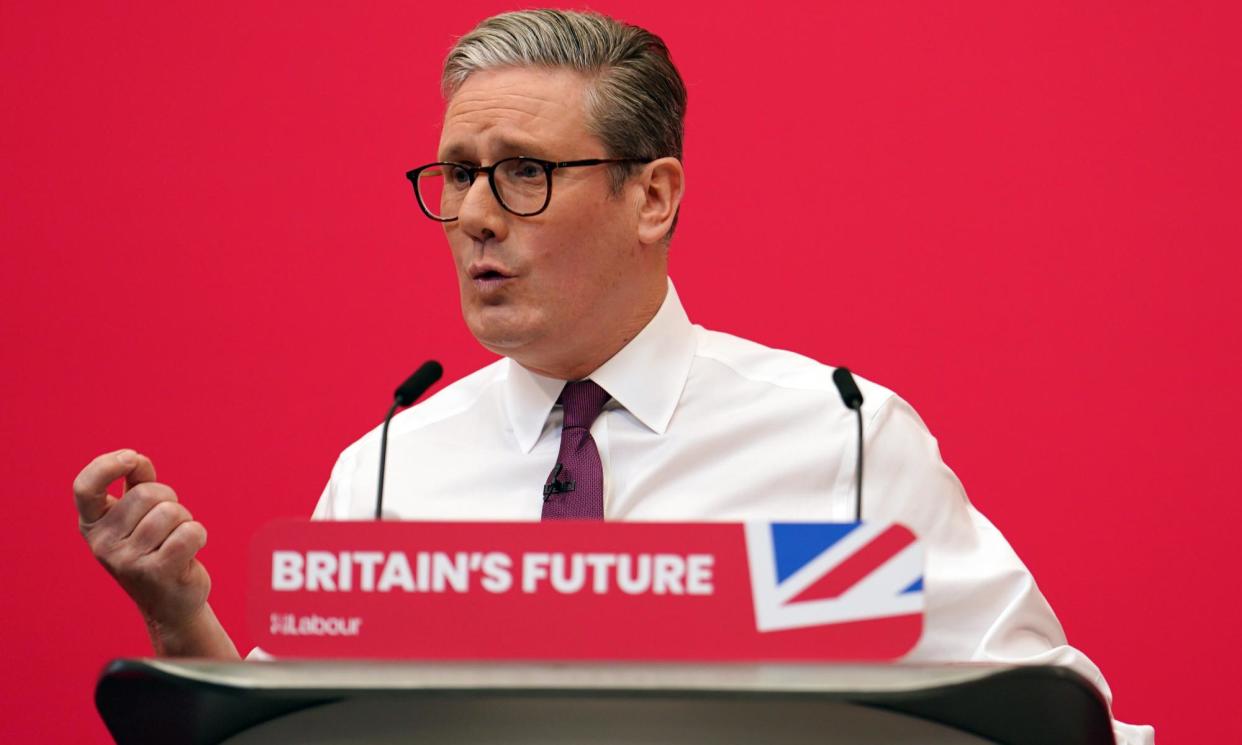Starmer says he cannot ‘turn the taps on’ to fix council funding crisis

Keir Starmer has told voters he cannot “turn the taps on” to fix the crisis in local authority funding as he was quizzed on how Labour would plug councils’ £4bn gap at the launch of its local election campaign.
“I can’t pretend that we could turn the taps on, pretend the damage hasn’t been done to the economy – it has,” he said. “There’s no magic money tree that we can waggle the day after the election. No, they’ve broken the economy, they’ve done huge damage.”
Starmer was speaking from a podium in Dudley in the West Midlands, where Boris Johnson previously launched the Conservatives’ levelling up pledge in 2020, a policy the Labour leader said had “unforgivably” failed.
“In saying levelling up, the government was tapping into something real that people yearn for. But they didn’t have a viable plan, and they didn’t do the hard yards. That’s unforgivable,” he said.
The choice of location was seen as a direct challenge to Andy Street, the West Midlands mayor, who will be fighting Labour’s Richard Parker for his third term as mayor in the region.
In his opening speech at the event, Parker accused Street of “working hard to pretend he’s not a Tory”, as he pledged to build more council homes and create 150,000 jobs in the region.
The launch, which also heard from Angela Rayner, Labour’s deputy leader, marks the start of a crucial campaign period for the party in what is being seen as an effective dress rehearsal for the general election.
The West Midlands is among ten mayoralties on offer, along with more than 2,600 English council seats and police and crime commissioners’ posts in England and Wales.
This election cycle was last contested in 2021, when the Conservatives under Johnson were much higher in the polls. Heavy losses for the Tories, and particularly for Street or Ben Houchen, the Conservative Tees Valley mayor, could bring renewed internal pressure on Rishi Sunak.
On Wednesday evening, the Labour leaders of four West Midlands councils, including Birmingham which declared itself effectively bankrupt last year, sent an open letter to Street to declare their “loss of confidence” in his ability to lead the region.
They cited his criticism of local councils (which help fund the West Midlands combined authority Street leads), “unfounded claims of success” and said he was using the council funding crisis “for political gain”.
The letter did not have the support of all Labour councillors, with one denouncing it as “petty political point scoring”.
Starmer declined to comment on whether bankruptcies at Labour-led councils would have an impact on the local elections in May, saying the party would introduce a better funding settlement to help local authorities manage their budgets.
Speaking later to Sky News, Starmer again stressed the lack of fiscal resources, saying councils could be helped with other ideas such as longer-term financial settlements from central government.
Another saving to local authorities, he argued, would be a ban on no-fault evictions, meaning there would be fewer people needing housing help from councils.
Starmer also directly targeted Sunak, saying that as Johnson’s chancellor he had “strangled levelling up at birth” by refusing to properly fund it.
“The idea of levelling up, in the sense of getting rid of the inequalities we see across the regions, that’s been around for years and years and years,” he said. “But if we’re really going to make a difference, we desperately do need to make a difference then that requires a viable plan.”
Speaking at the launch, Starmer also said he had hoped to have been launching a general election campaign, but said Rishi Sunak had “bottled it” by not yet calling one and that the prime minister wants “one last drawn-out summer tour”.
“The mayoral and local elections, and later in the year the national election, go together,” he said. “This is the first of a two part series. We have gone from a party that suffered the worst loss since 1935, to a serious contender as we go into that election.”
However, he warned that in order to achieve “even a two or three seat Labour majority” would require a bigger swing than in 1997, when Labour won a landslide victory against the Conservatives with a 179-seat majority.
“That is a sobering thought,” he said. “Put the polls to one side, it’s the hard yards of focus and discipline.”

 Yahoo News
Yahoo News 
